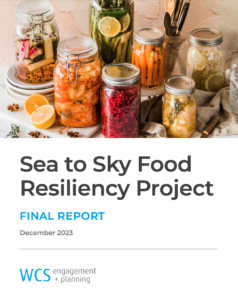Project Description
The Sea to Sky Food Resiliency Project focused on supporting more resilience in the regional social services food system that supports vulnerable populations in achieving food equity and food security. The project had three focus areas:
Food Insecurity: This focus area examined root causes of and contributing factors to food insecurity in the region. These include disruptions to work caused by injury and illness, the roles of precarious housing, insecure work arrangements, escalating living costs, food access challenges, and the loss of lands and water for traditional foods.
Food Supply Linkages and Infrastructure: This focus area covered the supply linkages from regional sources of food directly to Food Distribution Organizations (FDOs) and the infrastructure (e.g., storage, processing, and transportation) needed to support these regional linkages.
Food Equity During Emergencies: This area focused on the need for an equitable food response during times of emergency to support people with pre-existing social vulnerabilities.
Project Details
Municipal sponsor: Resort Municipality of Whistler
Grant funding: BC Poverty Reduction Planning and Action Program
Completion date: December 2023
Key deliverable: Final Report (Key Findings and Recommendations)


